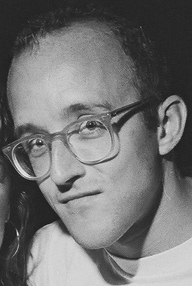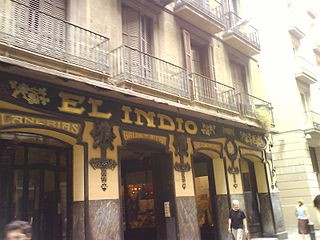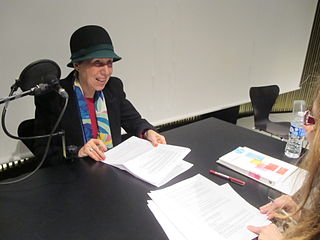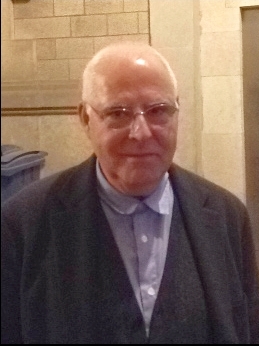
A mural is any piece of graphic artwork that is painted or applied directly to a wall, ceiling or other permanent substrate. Mural techniques include fresco, mosaic, graffiti and marouflage.

Keith Allen Haring was an American artist whose pop art emerged from the New York City graffiti subculture of the 1980s. His animated imagery has "become a widely recognized visual language". Much of his work includes sexual allusions that turned into social activism by using the images to advocate for safe sex and AIDS awareness. In addition to solo gallery exhibitions, he participated in renowned national and international group shows such as documenta in Kassel, the Whitney Biennial in New York, the São Paulo Biennial, and the Venice Biennale. The Whitney Museum held a retrospective of his art in 1997.

El Raval is a neighborhood in the Ciutat Vella district of Barcelona, the capital city of Catalonia. The neighborhood, especially the part closest to the old port, was formerly (informally) known as Barri Xinès or Barrio Chino, meaning "Chinatown". El Raval is one of the two historical neighborhoods that border La Rambla, the other being the Barri Gòtic; it contains some 50,000 people.

The Barcelona Museum of Contemporary Art is a contemporary art museum situated in the Plaça dels Àngels, in El Raval neighborhood, Ciutat Vella district, in Barcelona, Catalonia, Spain. The museum opened to the public on 28 November 1995.

Daniel García Andújar is a self-taught, outsider visual media artist, activist, and art theorist from Spain. He lives and works in Barcelona. His work has been exhibited widely, including Manifesta 4, the Venice Biennale and documenta 14 Athens, Kassel. He has directed numerous workshops for artists and social collectives worldwide.

Albert Ràfols-Casamada was a Spanish painter, poet and art teacher involved in the vanguard movements of his time. He is considered one of the most important, multifaceted Catalan artists of his time. His artwork began in the post-expressionist, figurative sphere but soon developed into his own abstract style grounded in a poetic rendering of everyday reality.

Eduard Arranz Bravo was a Catalan Spanish painter.

Eulàlia Grau, also known by her given name, Eulàlia is a Catalan artist. She was born in Terrassa in 1946. After training in Fine Arts at the Escola Eina and in design in Milan, she began her work starting from collage, using photographs taken from the written press, adopting a critical attitude towards information given out by the communication media. Her works carry a significant political charge and social content.

Benet Rossell, was a notable Spanish artist whose career spanned several decades and encompassed a diverse range of artistic endeavors.
Alex Vallauri was a Brazilian artist of Italian origin. Vallauri is a pioneer of street art and graffiti in the country.

Pablo Gabino Rey Sendón is a Spanish painter artist born in Barcelona in 1968.
Carles Delclaux Is is a textile artist trained in the Aymat factory and in the Massana School of Fine Arts in Barcelona.

Crack Is Wack is a mural created in 1986 by American artist and social activist Keith Haring. Located near the Harlem River Drive in East Harlem, the mural serves as a warning against crack cocaine use, which was rampant in major cities across the United States during the mid to late 1980s. As a symbol of anti-drug activism, Crack Is Wack commemorates Haring's powerful sociopolitical presence as an artist and remains a part of New York City's repertoire of iconic public art.

Antoni Llena is a Spanish artist.

A Pile of Crowns for Jean-Michel Basquiat is a 1988 painting created by American artist Keith Haring in 1988. The artwork was made to memorialize his friend, artist Jean-Michel Basquiat. It depicts a towering pile of Basquiat's trademark crowns.

Andy Mouse is a series of silkscreen prints created by American artist Keith Haring in 1986. The character Andy Mouse is a fusion between Disney's Mickey Mouse and Andy Warhol. The series consists of four silkscreen prints on wove paper, released in an edition of 30 per colorway, all signed and dated in pencil by Haring and Warhol.

Tuttomondo is a mural created by American artist Keith Haring in 1989. Located on the rear wall of the Sant'Antonio Abate church in Pisa, it is one of the last public murals executed before his death from AIDS-related complications in 1990. It is also one of the few outdoor public works created by Haring for permanent display.
The Keith Haring Mural is a mural created in 1984 by American artist Keith Haring. Located in Collingwood, Melbourne, the mural was added to the Victorian Heritage Register in 2004 for its historical, aesthetic and social significance to the State of Victoria.
Carmen Perrin is a Bolivian-born Swiss visual artist, designer, and educator. She has worked as a sculptor, site-specific artist, and printmaker, as well as worked in the design public garden spaces and public art in collaboration with architects. From 1989 to 2004, she was the university chair of her alma mater, École Supérieure des Beaux-Arts, Genève.
Unfinished Painting is a 1989 painting by Keith Haring. It is a 100cm by 100cm acrylic painting on canvas piece, recognizable by the large swath of canvas left exposed. It is known as one of Haring's final paintings before his 1990 death from AIDS-related complications at the age of 31. The artwork is currently on tour with the "Keith Haring: Art Is for Everybody" exhibit.

















